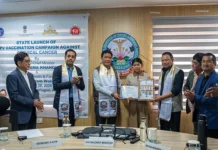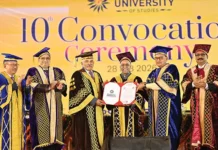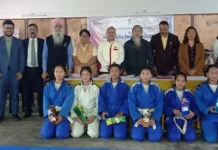Monday Musing
[ Junroi Mamai ]
Recently, the school education department launched a series of critical educational initiatives as part of Mission Learning Enhancement Arunachal Pradesh (LEAP) for the 2024-’25 academic session, with the aim of enhancing teaching and learning outcomes at all government schools across the state.
The initiatives, designed and developed in collaboration with Reach to Teach Foundation, which is a knowledge partner of the NITI Aayog, include the school readiness programme, learning recovery and enhancement programmes, board exam preparedness initiatives, Bagless Saturdays for all classes, vocational skills education for Class 6 to 12, and a 100-day FLN reading campaign for Class 1 to 3.
This much-needed initiative deserves appreciation from all, considering the steady decline in teaching quality and poor performance in the board examinations reported in our state. Nevertheless, while coming up with policies and schemes for educational development, the state government should not lose focus on the primary-level schools in the state, because primary-level education forms the basis of a child’s development. Regrettably, not much has been done in several years to improve the primary school-level education in our state.
The state government had a couple of years back launched Eklavya Model Residential Schools (EMRS) in several parts of the state. Started in 1997-’98, the launching of the EMRS is an initiative of the union tribal affairs ministry which aims at imparting quality education to ST children in remote areas. The state has around 10 such schools, one each in Bana and Seppa in East Kameng district, Nyapin in Kurung Kumey, Medo in Lohit, Dambuk in Lower Dibang Valley, Ziro-II in Lower Subansiri, Lumla in Tawang, and Khela in Tirap, besides one each in Aalo and Tirbin in West Siang. However, according to the 2023 data of the tribal affairs ministry, only one of the total 10 EMRS’ in the state are functional, ie, the EMRS in Bana, East Kameng.
We have also witnessed how a couple of years back the state government closed down many government-run schools in remote villages of the state, owing to non-enrolment of students. Poorly kept and short-staffed government-run schools have since been gradually replaced by non-affiliated residential schools run by private individuals, missionaries and other organisations.
Poor parents in remote areas get their wards enrolled in such schools considering the low-fee structures. Most of these schools assure the parents that their child will become fluent in English, be well-fed and properly kept, but how well are these schools actually functioning? Who are the monitoring authorities for these non-affiliated private schools or missionary schools? Who chooses the curriculum and who inspects the quality of food the children are provided with? These poor parents are generally unaware but mostly compelled to not question the functioning of these schools and, as a result, these institutions function without any restrictions and hold absolute power. In one such residential school, children have been found to have been fed only two times a day – once in the morning and later in the evening; no lunch is provided to them. Imagine having small children being made to sit through classes the whole day without lunch. There is also religious propagation, but nobody is questioning the school authorities. Such is the condition of these non-affiliated schools in our state. Such kinds of schools are running in every part of our state, but the issue is rarely given much importance. It is vital that primary-level education is made robust with the help of insightful governmental planning and its strict implementation at the ground level.




